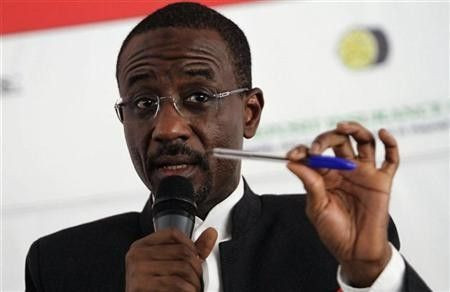Nigeria to put 5-10 pct of FX reserves into yuan

Nigeria's central bank plans to diversify its $33 billion in foreign exchange reserves away from the dollar by switching a tenth of the stockpile into yuan, underlining the momentum behind China's drive to internationalise its currency.
We are looking at anything to start with from 5 to 10 percent of our reserves, central bank governor Lamido Sanusi said on Monday.
The central bank had already said that it was considering reducing its reliance on the dollar, which economists say accounts for the bulk of its $32.96 billion in reserves. The bank does not publish the currency composition of its assets.
But Sanusi, speaking to CNBC news by telephone from China, said Africa's second-largest economy was not abandoning the dollar and euro. They are going to remain an important part of our holdings, he said.
Oil, which is denominated in dollars, generates 75 percent to 80 percent of Nigeria's total budget revenue, Samir Gadio with Standard Bank noted.
This suggests the greenback will remain the most relevant currency in Nigeria's public policy framework, he said.
Given that China accounts for 15 percent of Nigeria's imports, the planned switch is largely symbolic, added Bismarck Rewane, chief executive officer of Financial Derivatives in Lagos.
He's not taking any risk, Rewane said of Sanusi. That amount is even less than the total amount we spend on our trade with China, so he's not exposing our economy to it or taking a position.
Sanusi said he was also exploring a currency swap arrangement with China's central bank to make it easier to settle trade deals in yuan and would welcome investments by Chinese companies in Nigeria denominated in yuan.
China has made currency swap deals with countries ranging from Kazakhstan to Argentina and New Zealand.
GOING OUT
China has been actively encouraging the use of the yuan in trade transactions since the 2008/09 global financial crisis squeezed the ability of some importers of Chinese goods to obtain dollar funding.
Beijing is keen on the political influence that an internationally used currency confers, and some economists expect that the yuan, also known as the renminbi, could acquire the status of a reserve currency on a par with the dollar, euro or yen within a decade.
Others are doubtful.
There's obvious symbolism about a central bank opting to invest in renminbi assets. But I think the practicalities mean the renminbi's rise as a reserve asset is going to be very slow -- and probably a lot slower than most people expect, said Mark Williams with Capital Economics in London.
A deep pool of yuan deposits has formed in Hong Kong as a result of settling trade in renminbi. A thriving market in yuan-denominated bonds has also sprung up in the territory.
But the authorities in Beijing, determined to keep a firm grip on capital flows and the exchange rate, strictly limit how much yuan can be reinvested in China's financial markets, thus limiting the attraction of holding yuan.
There's a huge tension between two policies: on the one hand, wanting to internationalise the renminbi, and, on the other hand, wanting to control its value, Williams said. That's just a fundamental contradiction at the root of this move.
CHINA RISING
Because the yuan (CNY) cannot be freely converted for purposes unrelated to trade and investment, central bank reserves invested in the Chinese currency would not qualify as reserve assets under International Monetary Fund criteria.
The practical constraint with CNY is, first of all, the non-convertible nature of the currency; even if this was not the case, the Chinese bond market remains relatively illiquid, especially in contrast with the U.S. market, said Gadio with Standard Bank.
If Nigeria nevertheless does plough a chunk of its reserves into yuan, it would be the most striking evidence to date of central banks around the world grabbing the coattails of a fast-rising economic power whose currency is widely expected to keep appreciating.
Razia Khan, head of Africa research at Standard Chartered Bank in London, said the significance of a leading African central bank actively considering investing in yuan was greater than the relatively small sums at stake.
The fact that the measure has been undertaken by a major oil producer that receives most of its FX earnings in dollars is even more significant -- potentially opening the way for other African sovereigns, with more diverse trade profiles and trading relationships, to do the same, she said.
Malaysia's central bank, which has received a $200 million quota from Beijing to invest in Chinese financial markets, has bought yuan-denominated bonds, the Financial Times has reported.
Central bankers in Hong Kong, the Philippines and South Korea have also mused in public about diversifying their reserves into yuan.
Nigeria's deputy central bank governor, Kingsley Moghalu, told Reuters last month that the decision to diversify out of the dollar had been taken before Standard & Poor's cut the United States' AAA credit rating.
China is also deepening investment ties with Nigeria, as it is with countries across Africa. Chinese investors are helping to build a multi-billion-dollar free trade zone on the edge of Nigeria's commercial capital, Lagos, to try to develop a local manufacturing base.
© Copyright Thomson Reuters 2024. All rights reserved.





















